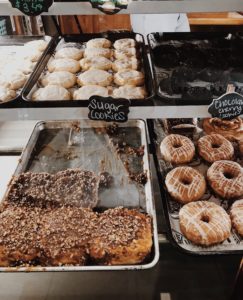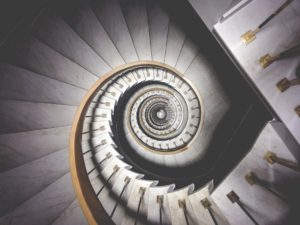When I underwent emotional intelligence training, my coach asked me the question, “Chocolate or vanilla?” over and over. Now, my partner and I use that phrase frequently as we live our life together. It always makes me smile.

Life is ridiculously complicated. At other times, it’s ridiculously simple. Our experience lies in the heart of this paradox.
Chocolate or vanilla is about choice, and the recognition and reclamation of our ability to choose is the core of emotional intelligence.
Choice is about power.
One of the many seeds that inspired this post was this article that appeared in my news feed from The Guardian: “A Dirty Secret: You Can Only Be a Writer if You Can Afford It.” It caught my attention because my reflex now is to question all these kinds of assertions, whether they are a result of my own beliefs or someone else’s.
Is that true? I asked myself.
Upon reading the article, I discover the author is making a point that earning a living by writing is difficult. Agreed. Does that mean one is not a writer if they don’t earn a living writing? That depends on how one defines what a writer is. This circles around to identity. What is a writer? What is a real writer?
Why does it matter? If a person is compelled to write, they do so. Debating what a “real” writer is, making rules about what “counts” as writing (editing? Tech writing? Poetry? Published writing? Unpublished writing? Writing for money? Blogging for free?), gathering statistics about the high costs of publishing, editing, hiring an agent, advertising, etc., seem to me distractions from writing, even if it’s only for twenty minutes a day.
Is the issue about choosing to live creatively or about managing our expectations of such a life and feeling disempowered by the attendant difficulties in earning a living via our creativity?
The tone of the article bothers me because it’s focused negatively. It’s about being creatively disempowered because the world is the way it is. It’s all the reasons why writers can’t be successful (whatever that means) unless they have a certain amount of money.
I don’t accept that.

Why not think about what is possible? Where is our power? The author states space and time cost money. Is that true? We all have the same 24 hours in a day. We make hundreds of choices about how we spend that time. Some of our choices are unconscious, and some are not. The minimalism movement speaks to this. If our lives are so busy, noisy and cluttered that we don’t give our creative longings (or whatever else matters most to us) time and space, we’re the only ones who can fix that. And make no mistake, we can fix it. We have the power to simplify our lives and identify what matters most to us. If we want to. If we consent to.
As I observe myself and others navigate through their lives, it’s easy to pick out those who feel powerless from those who acknowledge at least some power. Note that power does not mean control. Power is “the ability to do something or act in a particular way.” Control is “the power to influence or direct people’s behavior or the course of events.” (Online Oxford Dictionary) Power is intrinsic. Control is extrinsic.
It strikes me when we feel disempowered about one thing, we frequently expand that feeling to our whole lives. We feel victimized, stuck, fearful, hopeless and helpless. Often, we’re enraged by the unfairness of life. We desperately try to find a sense of control. Our default is to stay focused on all the places we have no power, no matter what the situation.

That focus is a choice. It might be unconscious, but it’s still a choice.
Chocolate or vanilla?
I know we each have obligations, complicated lives, and most of us need to earn a living. As a single mother of two boys, I worked a full-time job, a part-time job, did volunteer work and took online courses to complete a college degree. Believe me, I know about being overwhelmed in life. During those years I also danced, told stories, wrote, and created visual art, because that’s who I am. I didn’t earn money with my creativity, but it was what kept me going in all the other areas of my life.
I understand sometimes we are disempowered by addiction and/or other health issues, and we are unable to make choices because of it. In that case, we need help, and we can choose to get it. Or not.
Chocolate or vanilla?
As for space, writing can happen on a bed, on the floor, on a park bench, in a car, or in a Starbucks. In my life, I’m not at all sure where the boundary is between writing and living. I seem to always be doing both, whether or not I’m actually at the keyboard or with a pen in my hand.
Being creative is not the same as an ambition to get rich and famous via our work. If the goal is riches and fame, we’ve stepped out of our power. Then we’re going to need money, influence, professional support, and a lot of luck. Even if we do achieve fame, financial security and glory, however, let’s not kid ourselves. We’ll still need to manage our money and time, and we’ll still have exactly as much time as everyone else does.
We’ll still have to choose between chocolate and vanilla every minute, and if we refuse to choose, somebody else will choose for us.
We can’t reclaim or effectively hold onto our power unless we’re willing to question everything, and questioning everything is not supported in this culture. If we’re not living the life we want, there’s one important question to ask:
If we feel disempowered, do we want to feel differently? Do we consent to change?
Most of us will immediately say yes, of course we don’t want to feel disempowered! What a stupid question! BUT we can’t, because we have no money. We have no time. We have health limitations. We can’t find work, or we have work, but our boss hates us. Our commute is too long. We don’t have the space we need. Nobody loves us. Nobody cares. We’re alone. We’re too old. We’re too young. We’re too tired. We’re the wrong color or sex. Nothing and no one is the way we need them to be in order for us to live in our power.
The truth is our personal power has nothing to do with the people around us or the way the world works. Only one person can fundamentally disempower us, and that person looks back at us out of the mirror.
Another unwelcome truth is many people who feel chronically disempowered are getting some kind of a payoff for staying stuck in that place.

This hidden payoff is a hard, hard thing to admit and excavate, take it from me. Our defenses rise, our feelings boil, our beliefs become more fanatical, all our old wounds bleed. Hidden payoffs are buried deeply in psychic war zones. Many of us never go there unless we’re forced to by some kind of a catastrophic, life-and-death situation.
I started this post on a Tuesday morning. I was sitting at my little workstation in my attic space next to an open window. The air was fresh and cool. It was misty out, and I could hear the spring birdsong. I opened my laptop and skimmed headlines about politics, COVID-19, and overnight killer tornados in Tennessee. There was the seductive content on my screen, manipulated by the media, Google, and advertising. Then there was the world outside my window, gentle, lovely, moist, and promising the new beginning of spring.
Chocolate or vanilla?
I shut the laptop, picked up a clipboard and pen, and began this post long hand, the old-fashioned way, in my chair in front of an open window.
© 2020 – 2022, Jenny Rose. All rights reserved.
It’s good to know that you live and write in my world.
Thank you.
XO